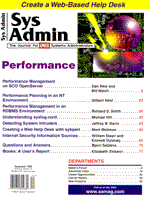
Editor's Forum
Most people are familiar with the comedian Rodney Dangerfield. Although his style of humor may not appeal to everyone, his famous "no respect" line is something that most people can identify with at one time or another. If you push the thought of Mr. Dangerfield and this month's theme, performance, through the same synapse, you may arrive at an alternate conspiracy theme for "The X Files." Did Rodney really start his career as a systems performance analyst at some dusty UNIX shop in the heartland of America? A potentially intriguing thought, for few aspects of system administration are traditionally given as little respect as performance monitoring and capacity planning. We are usually just too darned busy trying to put out the latest batch of brush fires or tinkering with the latest hot technology to give much thought to performance. Let's buy another Alpha instead. But let's get the 500 MHz model this time - that will surely solve our problems. The theme articles in this issue examine various aspects of performance monitoring - the first step in actually being able to rationally plan your system's capacity. What to look for, how to look for it, and what to do with it once you have found it. All good and necessary details, particularly for readers who have the [ good || mis- ] fortune of growing up in the post-bigiron age. The more chronologically enriched members of the crowd will remember when it was an accepted practice to expend ten to fifteen percent of the system overhead in watching the system overhead. (The origin of endless loops, perhaps.) As systems became smaller and moved off the raised floors, however, performance monitoring was a topic that the storytellers often forgot to pass on. Alas. Managers in the Eighties had other priorities for us. Rodney should be encouraged by the compulsion among businesses to be part of the Web, however. Few things other than the search for megabyte-long prime numbers are quite as taxing on our systems as the rich content and high-speed communications demands of Web content. As an increasing amount of commerce is done on the Web, or the Internet in general, more managerial attention is being given to system performance. The old adage, "time is money" is shifting toward "hits are money." Keeping Web surfers happy requires performance. Big time. Providing the level of performance required in today's computing environment requires an in-depth understanding of what is going on in the system and what to tune to maximize the system's capacity. Fortunately, the rules of that game have not changed much, and the trickle-down of performance tools from the remaining bigiron folks has already started. Given sufficient resources, we can keep the systems working fast enough to do electronic commerce. The bucks roll in, but now they're in packets. Thus, the fact that performance management has a direct impact on the bottom line is now obvious enough for managers to understand. Perhaps, finally, Rodney the performance analyst will get some respect.
Sincerely yours,
|